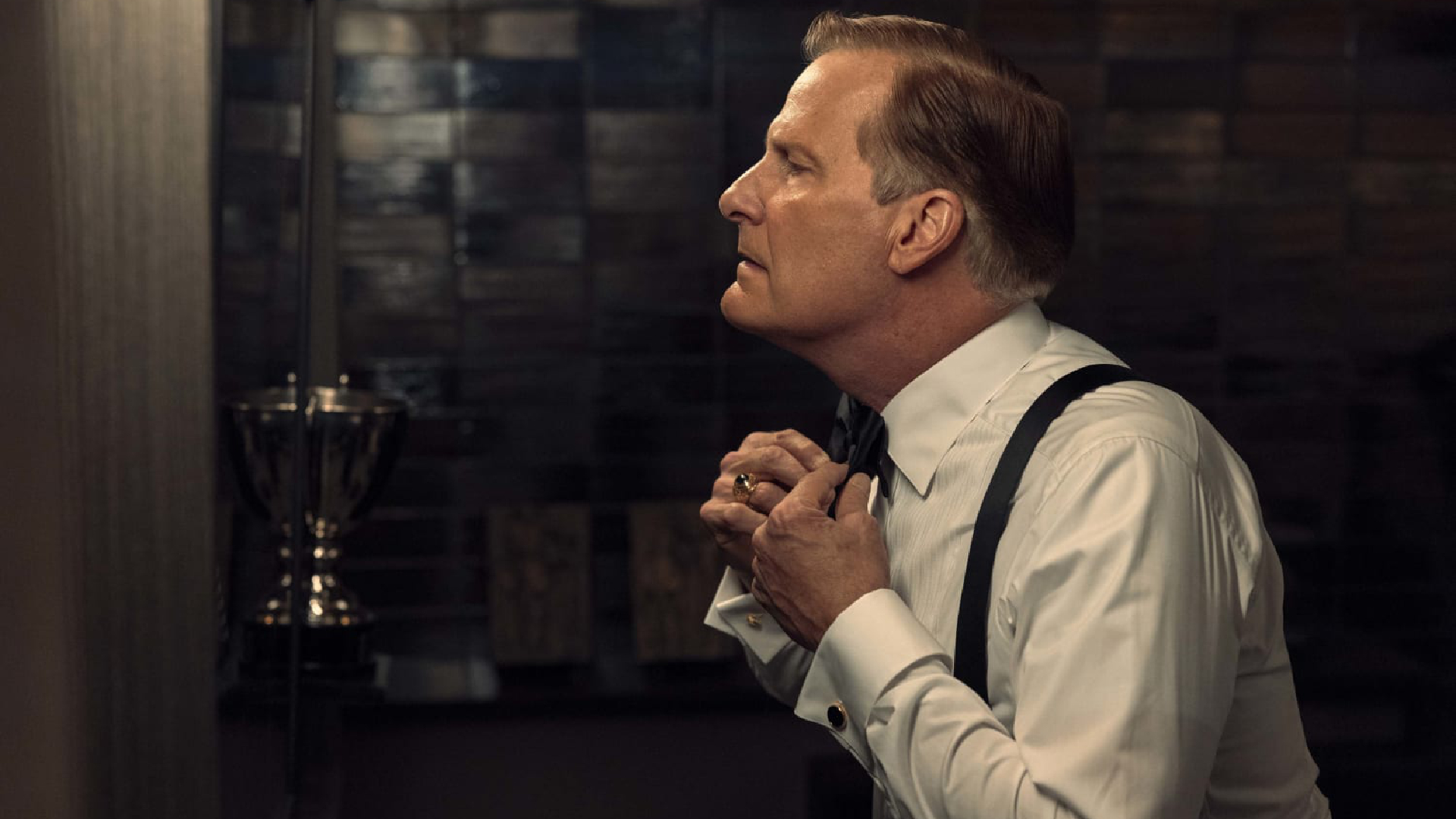
"A Man in Full," Netflix's limited series rendition of Tom Wolfe's 1998 novel, didn't land well with critics. It garnered a Tomatometer of just 46% on Rotten Tomatoes and its audience score is even lower at 44%. Thus, while it's not breaking into the top 10 Netflix shows to watch over Memorial Day weekend, I still found it particularly moving in the face of some rather strange directorial decisions.
Led by the fierce Jeff Daniels, who plays real estate mogul Charlie Croker on the cusp of bankruptcy, "A Man in Full" tells an interweaving story of politics, class structure, and masculinity. At certain times, it can be a tough watch, but at the core of its narrative is one that aims to show viewers the true road to being a man.
"A Man in Full" is no "Succession" or "Billions" before it, nor does it aim to take up this type of role. Instead, it focuses more on the hijinks and the realities faced by those who live in Atlanta, Georgia. Sure, it might not land as well in the end, looping back upon where it starts, but "A Man in Full" doesn't aim to take itself too seriously — which might be its biggest downfall but in my mind plays to its best function.
In all but a mere six-episode string, this Netflix drama showed me above all else what it means to care and how best to hold oneself in the face of adversity. It might not be the best portrayal of masculinity, but maybe critics aren't looking at "A Man in Full" to its fullest potential.
The hilarity in masculinity

Charlie Croker (Jeff Daniels) sucks. We have a smattering of main characters that we aren't supposed to like, there's nothing new with that narrative template, but Croker's guise over his peers is one of godhood and entitlement, making it hard to truly care about him. It's pleasantly brought out best of all in the character's deep southern drawl, which Daniels had to come up with all on his own.
On opposite ends of this battlefield is Tom Pelphrey's banker character Raymond Peepgrass, whose name alone speaks volumes on the type of man he is. Living in a thinly-walled walk-up, eating heated dinners all by his lonesome, Peepgrass is the spitting image of a lonely man still in search of what exactly he wants to make of his world.
He offers the perfect parallel and foil to Croker, whose real estate empire has made him a beacon of manhood in the same Atlanta circles Peepgrass finds himself orbiting. These two entities clash as Peepgrass, under the authority of his bank, attempts to bring Croker down through impending debts that reach into the hundreds of millions.

I don't want to spoil the ending, but this rivalry between the two comes to quite the head (no pun intended). It's not the ending that many might have hoped for, and it's certainly not one of immediate praise — but what it does is prove the hilarity apparent on both sides of this war in masculinity.
Where Peepgrass sees himself as a Croker in the making, aiming to embody the same principals and ideals that the seedy real estate mogul presents, he loses his own masculinity and purpose. And in that same vein, Croker's continued appetites, on bullying those around him and clinging to his empire through malfeasance, creates this very cycle so aptly presented in the story's setup and payoff: faced with his own mortality, he will always lose.
For those rooting for Peepgrass to come out victorious, it's the other tale in this six episode series that takes the most precedence in shaping our look into real masculinity.
The other side of the story
Where Croker and Peepgrass' war takes dominance on the main stage, in the backdrop of "A Man in Full" is the story of Conrad Hensley (Jon Michael Hill). As a young black man living in Atlanta with no prior convictions, Hensley is an upstanding citizen, one that is presented with a life-altering event after assaulting a police officer in the midst of being violently detained over a simple parking violation.
It's a striking image, one that the show's director, Regina King, definitely planned to be insightful. It's from this story beat that "A Man in Full" takes two directions, one showcasing a war between two white men in the throes of existential change, the other a young black man struggling for freedom in a system rigged from the start.
At Hensley's side is Roger White (Aml Ameen), council to Croker and a whipsmart lawyer full of purpose. Contrary to its opposing storyline, on this side of the coin, White and Hensley work together despite being at odds at times in an attempt to free Hensley from potential conviction.

With a baby on the way, it's a terrifying reality that he doesn't want to face. And the scenes presented of Hensley awaiting trial in Fulton County prison are anything but pleasant, though they do highlight the drastic worlds of difference shared across the characters on-screen, with Hensley's actions of standing tall in the face of danger and looking out for his fellow inmates is the true act of pure masculinity.
In tandem with this portrayal is White's actions on getting Hensley freed. Instead of diving deep into his anger and rage, fueling his hate for a judge who is clearly being unreasonable (and, if nothing else, slightly racist), White uses the judge's own ideals and convictions against him to get Hensley's case cleared.
So, although "A Man in Full" might not be full in its showcasing of masculinity, it has certain insights into drawing out the better person inside all of us. Looking past its often grotesque and comedic narrative decisions, I came to find "A Man in Full" is worthy of the six-episode experience — so long as you take from it the parts that really matter.
More from Tom's Guide
Sign up to get the BEST of Tom's Guide direct to your inbox.
Get instant access to breaking news, the hottest reviews, great deals and helpful tips.

Ryan Epps is a Staff Writer under the TV/AV section at Tom's Guide focusing on TVs and projectors. When not researching PHOLEDs and writing about the next major innovation in the projector space, he's consuming random anime from the 90's, playing Dark Souls 3 again, or reading yet another Haruki Murakami novel.
-
SanchoPanza After 4 episodes, I was losing interest. Conrad was the only truly sympathetic male character and came to any unexpected resolution. Peepgrass was a slimy caricature that I would love to play poker against for his total lack of self control and demonstrativeness. The mayor displayed the baseless lack of character seen in most politicians. Croker was a Trump wannabe. Richmond, though lower key, was just as repulsive in his own way despite his less overt Alpha male tendencies. I was a bit surprised Diane Lane signed up for this. While obviously a fantasy scene for many of a certain age, I was surprised to see her in that position. All things considered, I thought this ended as well as it could for most of the characters as I wanted to see it, if not down right hilarious. Some characters surprised me, but I really wanted to see the cop have more of a comeuppance. All in all, it was disappointing overall, but but while many shows fizzle to a predictable ending this ended with a magnificent flourish. It's worth a watch but isn't deserving of any accolades.Reply
